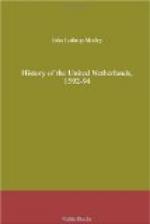[The Venetian ambassador
Contarin relates that in the reign of James
I. the great nobles
of England were served at table by lackeys on
they knees.]
A queen, who to loose morals, imperious disposition, and violent temper united as inordinate a personal vanity as was ever vouchsafed to woman, and who up to the verge of decrepitude was addressed by her courtiers in the language of love-torn swain to blooming shepherdess, could naturally find but little to her taste in the hierarchy of Hans Brewer and Hans Baker. Thus her Majesty and her courtiers, accustomed to the faded gallantries with which the serious affairs of State were so grotesquely intermingled, took it ill when they were bluntly informed, for instance, that the State council of the Netherlands, negotiating on Netherland affairs, could not permit a veto to the representatives of the queen, and that this same body of Dutchmen discussing their own business insisted upon talking Dutch and not Latin.
It was impossible to deny that the young Stadholder was a gentleman of a good house, but how could the insolence of a common citizen like John of Olden-Barneveld be digested? It was certain that behind those shaggy, overhanging brows there was a powerful brain stored with legal and historic lore, which supplied eloquence to an ever-ready tongue and pen. Yet these facts, difficult to gainsay, did not make the demands so frequently urged by the States-General upon the English Government for the enforcement of Dutch rights and the redress of English wrongs the more acceptable.
Bodley, Gilpin, and the rest were in a chronic state of exasperation with the Hollanders, not only because of their perpetual complaints, but because their complaints were perpetually just.
The States-General were dissatisfied, all the Netherlanders were dissatisfied—and not entirely without reason—that the English, with whom the republic was on terms not only of friendship but of alliance, should burn their ships on the high seas, plunder their merchants, and torture their sea-captains in order to extort information as to the most precious portions of their cargoes. Sharp language against such malpractices was considered but proof of democratic vulgarity. Yet it would be hard to maintain that Martin Frobisher, Mansfield, Grenfell, and the rest of the sea-kings, with all their dash and daring and patriotism, were not as unscrupulous pirates as ever sailed blue water, or that they were not apt to commit their depredations upon friend and foe alike.
On the other hand; by a liberality of commerce in extraordinary contrast with the practice of modern times, the Netherlanders were in the habit of trading directly with the arch-enemy of both Holland and England, even in the midst of their conflict with him, and it was complained of that even the munitions of war and the implements of navigation by which Spain had been enabled to effect its foot-hold in Brittany, and thus to threaten the English coast, were derived from this very traffic.




